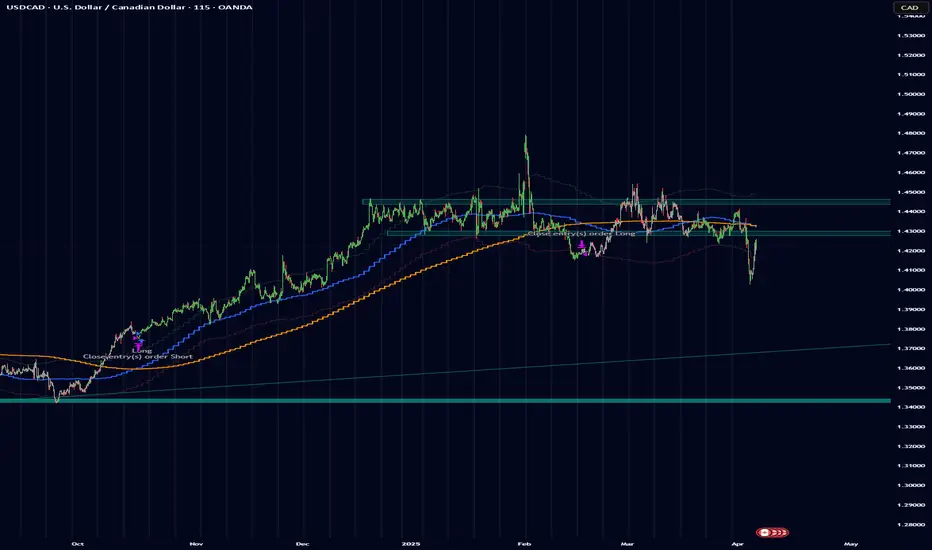USD/CAD – Breakdown Retest Offering Strategic Short Opportunity

Week of: April 7–11, 2025
Bias: Bearish
Trade Duration: 2–5 Days
Status: Breakdown Confirmed – Retesting from Below
Current Reflexivity Phase: Phase 3 – Crowd Denial / Re-Entry Trap
Strategy Type: Structural Breakdown + Sentiment Dislocation
Execution Style: Reactive, not predictive
🧠 Strategic Thesis
USD/CAD has broken decisively below its prior 2-week base and is now retesting that structure from below. The pair is showing textbook behavior of distribution > breakdown > retest—a setup that often leads to emotional unwinds when conviction collapses.
Though USD sentiment remains firm, the structure disagrees—and price is leading positioning.
🔍 Structure Breakdown Highlights
Clear break beneath consolidation range
Retest is unfolding in low-momentum fashion (no bullish drive)
Lower highs persist on multiple timeframes
No fresh demand seen on the retest so far
Ideal short continuation trigger if rejection holds
📊 COT & Sentiment Snapshot
Leveraged Funds: Still long USD/CAD, but have begun reducing size
Commercials: Gradual CAD accumulation underway
Open Interest: Rises on down moves, fades on up moves — shows weak demand conviction
Retail Sentiment: Still bullish on USD, ignoring structural breakdown
Institutional Bias: Quiet rotation toward CAD strength
📌 Translation: Belief in USD remains, but smart money is already moving. This dislocation is your edge.
🧠 Behavioral Finance Triggers
“Crowds trust the story. Price tells the truth.”
Anchoring to old bullish setups
Late buyers still entering on dips
Retest becomes a re-entry trap for overconfident longs
If rejection confirms, emotional exits fuel momentum
🔄 Reflexivity Model – Phase Breakdown
Phase Description
Phase 1: USD/CAD long crowd builds on USD strength narrative
Phase 2: Structure breaks below key base – already completed
Phase 3: Now Active – Crowd in denial, price retesting from below
Phase 4: Flush and capitulation if retest fails, triggering stop cascades
✅ Current Phase: 3 – Re-Entry Trap / Denial Before Exit
🛠️ Execution Plan
Entry: Wait for clean rejection candle or lower-high after retest
Risk Management: Invalidate if structure is reclaimed and price sustains above the broken zone
Exit Plan: Scale out as price moves into areas of prior demand or volume voids
Trade Style: Tactical, reactive — confirm behavior before acting
Expected Duration: 2–5 trading days if follow-through holds
🕰️ Execution Timeline
Monday: Monitor the retest — don’t rush entry
Tuesday–Wednesday: Best window for rejection and short setup
Thursday–Friday: Manage open exposure, secure gains or trail
✅ Strategic Summary
This is not a top call — the top is already in
Structure has changed, but belief lags
The crowd is doubling down — structure is calling their bluff
Let rejection confirm, then lean into the unwind
“You don’t need to predict. Just follow the failure.”
Bias: Bearish
Trade Duration: 2–5 Days
Status: Breakdown Confirmed – Retesting from Below
Current Reflexivity Phase: Phase 3 – Crowd Denial / Re-Entry Trap
Strategy Type: Structural Breakdown + Sentiment Dislocation
Execution Style: Reactive, not predictive
🧠 Strategic Thesis
USD/CAD has broken decisively below its prior 2-week base and is now retesting that structure from below. The pair is showing textbook behavior of distribution > breakdown > retest—a setup that often leads to emotional unwinds when conviction collapses.
Though USD sentiment remains firm, the structure disagrees—and price is leading positioning.
🔍 Structure Breakdown Highlights
Clear break beneath consolidation range
Retest is unfolding in low-momentum fashion (no bullish drive)
Lower highs persist on multiple timeframes
No fresh demand seen on the retest so far
Ideal short continuation trigger if rejection holds
📊 COT & Sentiment Snapshot
Leveraged Funds: Still long USD/CAD, but have begun reducing size
Commercials: Gradual CAD accumulation underway
Open Interest: Rises on down moves, fades on up moves — shows weak demand conviction
Retail Sentiment: Still bullish on USD, ignoring structural breakdown
Institutional Bias: Quiet rotation toward CAD strength
📌 Translation: Belief in USD remains, but smart money is already moving. This dislocation is your edge.
🧠 Behavioral Finance Triggers
“Crowds trust the story. Price tells the truth.”
Anchoring to old bullish setups
Late buyers still entering on dips
Retest becomes a re-entry trap for overconfident longs
If rejection confirms, emotional exits fuel momentum
🔄 Reflexivity Model – Phase Breakdown
Phase Description
Phase 1: USD/CAD long crowd builds on USD strength narrative
Phase 2: Structure breaks below key base – already completed
Phase 3: Now Active – Crowd in denial, price retesting from below
Phase 4: Flush and capitulation if retest fails, triggering stop cascades
✅ Current Phase: 3 – Re-Entry Trap / Denial Before Exit
🛠️ Execution Plan
Entry: Wait for clean rejection candle or lower-high after retest
Risk Management: Invalidate if structure is reclaimed and price sustains above the broken zone
Exit Plan: Scale out as price moves into areas of prior demand or volume voids
Trade Style: Tactical, reactive — confirm behavior before acting
Expected Duration: 2–5 trading days if follow-through holds
🕰️ Execution Timeline
Monday: Monitor the retest — don’t rush entry
Tuesday–Wednesday: Best window for rejection and short setup
Thursday–Friday: Manage open exposure, secure gains or trail
✅ Strategic Summary
This is not a top call — the top is already in
Structure has changed, but belief lags
The crowd is doubling down — structure is calling their bluff
Let rejection confirm, then lean into the unwind
“You don’t need to predict. Just follow the failure.”
Trade active
Status: Perfect TemplatePullback = 1 full day (Friday)
Monday = Sideways
📌 Tuesday = Entry short trigger if downside resumes
✅ Live Execution: Wait for breakdown confirmation
Disclaimer
The information and publications are not meant to be, and do not constitute, financial, investment, trading, or other types of advice or recommendations supplied or endorsed by TradingView. Read more in the Terms of Use.
Disclaimer
The information and publications are not meant to be, and do not constitute, financial, investment, trading, or other types of advice or recommendations supplied or endorsed by TradingView. Read more in the Terms of Use.